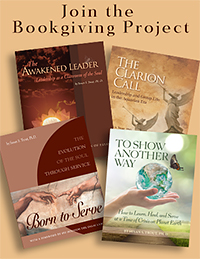H.H. the Dalai Lama
Be wisely selfish and know that your happiness depends on the happiness of those around you and the world in general. If society suffers, you will suffer, so love yourself enough to work
for the social good.
~ H.H. the Dalai Lama ~
In early 1997, through a series of auspicious dreams, His Holiness the Dalai Lama encouraged Susan Trout to invite him to write the foreword to her book, Born to Serve: The Evolution of the Soul Through Service. Susan sent word to His Holiness, graciously accepting his offer. She received the following foreword from him soon after.
Foreword by H. H. the Dalai Lama to Born to Serve: As human beings, we all want to be happy. One of the most important foundations for happiness is mental peace. From my own limited experience, I have found that the greatest inner tranquility comes from the development of love and compassion.
As human beings, we all want to be happy. One of the most important foundations for happiness is mental peace. From my own limited experience, I have found that the greatest inner tranquility comes from the development of love and compassion.
The more we care for the happiness of others, the greater is our own sense of wellbeing. Cultivating a close, warmhearted feeling for others automatically puts the mind at ease. It helps remove whatever fears or insecurities we may have and gives us the strength to cope with any obstacles we encounter. It is the ultimate source of happiness in life. If we remember that it is not just ourselves, but everyone who has to undergo suffering, this realistic perspective will increase our determination and capacity to overcome difficulties. Indeed, with this attitude, each new obstacle can be seen as another valuable opportunity to improve our minds.
Whether people are beautiful and friendly or unattractive and disruptive, ultimately they are human beings, just like ourselves. Like us, they want happiness and do not want suffering. Moreover, their right to overcome suffering and be happy is equal to our own. When we recognize that all beings are equal in both their desire for happiness and their right to obtain it, we automatically feel an empathy and closeness towards them. Through acquainting our minds with this sense of universal altruism, we develop a feeling of responsibility of others: the wish to help them actively overcome their problems. This wish is not selective; it applies equally to all. As long as there are human beings experiencing pleasure and pain, just as we do, there is no reason for discriminating between them by altering our concern for them if they behave negatively.
Because we all share a wish for happiness and an identical need for love, it is possible to feel that anybody we meet, in whatever circumstances, is a brother
or sister.
Recent advances in science and technology have led all over the world to an undue emphasis solely on material development. We have become so engrossed in its pursuit that, almost without knowing it, we have neglected to foster the most basic human needs for love kindness, cooperation, and caring. But the development of human society is based entirely on people helping each other. If we lose this essential humanity, what is the point of pursuing only material improvement?
In this book, Dr. Susan Trout draws on her long experience to discuss serving others as a means to greater happiness and spiritual development. We find that this is one of the common elements of almost all spiritual traditions. Indeed, I believe it reflects a fundamental aspect of human nature. Because we all share a wish for happiness and an identical need for love, it is possible to feel that anybody we meet, in whatever circumstances, is a brother or sister. We do not need to become religious; nor do we need to believe in an ideology. However, at every level of society, the key to a happier and more successful world is the growth of compassion and the active wish to help each other.
H. H. the Dalai Lama
Dharmasala, Himachal Pradesh, India
March 31, 1997
Reference: Susan S. Trout. Born to Serve: The Evolution of the Soul Through Service. Alexandria, VA: Three Roses Press, 1997. All Rights Reserved.
Photo attribution: Dharmsala, India, July 2009. The 14th and current Dalai Lama, Tenzin Gyatso, at his home in Mcleod Ganj. Photo by Salvacampillo.
This website, designed by the Institute for the Advancement of Service and representing the psychological-spiritual books, courses, teachings, and practices it developed over its 45 years as a nonprofit organization (1980-2025), is not intended to provide medical or mental health care. The books, courses, teachings, and practices represented on this website do not provide psychotherapy, medical therapy, or a substitute for either one. Users of this website are expected to assume self-responsibility for their wellbeing by seeking, when appropriate, psychological and medical professional services.
Every good-faith effort has been made to document accurately any reference material and citations used throughout this website.
Copyright © 2025 by Susan S. Trout. You are free to share selections from this website for noncommercial purposes if you attribute what you share to the Institute for the Advancement of Service and Susan S. Trout. You may summarize the material on this website provided you accredit it to the Institute for the Advancement of Service and Susan S. Trout and do not alter its meaning.




